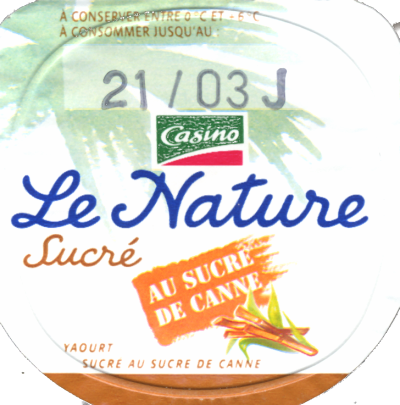French brand name gender
Une note sur le genre grammatical des noms de marque. Qui n’explique pas pourquoi le Nutella est masculin.
Here’s a scan of the top of a yoghurt I ate this morning:

The noun nature, like nearly all feminine nouns that came directly from Latin, has feminine gender: la nature. But we aren’t talking about nature as such here, but about a product name (of the supermarket chain Casino’s house brand). In this case, gender assignment works differently: the brand or product name’s gender is the same as the gender of the noun that denotes the generic product category:
- generic noun: voiture (car) — feminine; thus: la Jaguar, la Twingo, la Taurus (even though jaguar, the name of the animal, is masculine and the other two car makes have masculine-looking endings)
- generic noun: montre (watch) — feminine; thus: la Swatch, la Rolex
- generic noun: fromage (cheese) — masculine; thus: le brie (even though la Brie, the region where brie is made, is feminine)
Yaourt being masculine, we get le Nature. Though I imagine this might confuse some elementary school children, especially given the typesetting, which is reminiscent of the handwriting taught to young pupils.
(I should add that there is a double sense in there: used attributively, nature means something like unflavoured or unadulterated. So un yaourt nature means an unflavoured yoghurt, which actually should be free of added sugar as well. This doesn’t only apply to yoghurt. Une crêpe nature is a pancake without topping, une brioche nature isn’t covered in sugar or chocolate bits, des pommes de terre nature are simply potatoes, raw or cooked, without anything else, like sour cream or cottage cheese.)
The system isn’t perfect: I don’t think I’ve ever seen anything but le/un Snickers, le/un Kitkat, le/un Twix, despite the generic term, barre chocolatée, having feminine gender.
And none of this explains why Nutella is masculine.
Related posts: Minimalist Kitkat, Fake French in Victorian novels, Mon pin's est greenz, Branding: IPA and exotism, Nutella, left-wing and macho, Pas aussi atroce que ça !, Cinderella, vair or verre?
Technorati (tags): advertising, French, gender, language, langue


Well, what is the generic term for Nutella?
Actually, one thing I wonder about more generally is what happens when there’s more than one possible generic term. I can’t think of an example offhand where the possibilities disagree in gender, but, for example, if I’m trying to figure out what the gender of Snickers, KitKat, Twix, etc., would be if it followed the regular pattern, how do I know that the relevant generic term is barre chocolatée rather than friandise?
In Québec, we do say “une Snickers”, “une Kitkat”, “une Twix”. An example of a problem created by more than one possible generic is “vending machine”. The generic isn’t the same in France and in Québec. In France, they say “un distributeur”, the generic being “appareil”. In Québec, we say “une distributrice”, the generic being “machine” (probably under the influence of English).
On the French Nutella website, the generic seems to be “pâte à tartiner”, but they still say “du Nutella”… Le mystère reste entier.
@Q.: As Sophie said, la pâte à tartiner (tartiner means “smear on bread”, of bread spreads, or something). Or, maybe, la crème. Anyway, there’s an over-abundance of reason why Nutella should be feminine. I’ve been known for badgering every French speaker I know about this, and a friend from South-Eastern France told me that in the local dialect, it could be feminine — which led to intentional misunderstandings among his extended family over the breakfast table.
And I agree with both of you that there’s variation about what the generic should be in the first place. Though I’m not sure the difference between “distributeur” and “distributrice” comes from the generic. Maybe Québec French is just more consistent: machines of all kinds are most of the time feminine (une imprimante — a printer, une perceuse — a power drill, une dévisseuse — an unscrewer (hmm…), une agrafeuse — a stapler; but: un perforateur — a hole-puncher, un réfrigérateur — a fridge …).
Mon amie a suggéré que le Nutella serait un “beurre”, ce qui pourrait expliquer le masculin.